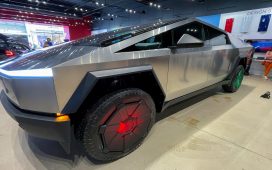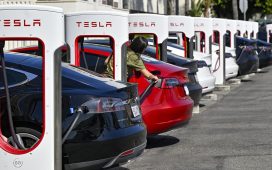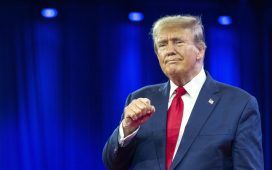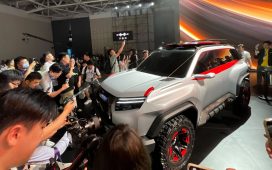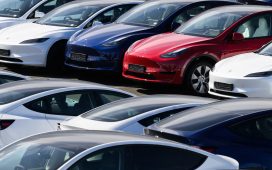President Donald Trump meets with CEO of General Motors Mary Barra (L), CEO of Fiat Chrysler Automobiles Sergio Marchionne (2nd R) and Fiat Chrysler Head of External Affairs Shane Karr (R) in the Roosevelt Room of the White House on January 24, 2017 in Washington, DC.
Shawn Thew | Pool | Getty Images
LOS ANGELES – Following President Donald Trump’s comments about potentially delaying a new trade deal with China until after the 2020 election, the automotive industry isn’t expected to make any knee-jerk reactions.
Several auto executives during the L.A. Auto Show last month told CNBC that they are controlling what they can when it comes to the Trump administration’s trade war with China, tariffs and other political and regulatory uncertainties. That includes evaluating and understanding potential consequences, while also continuing to operate their businesses as usual.
“To be honest, I don’t really worry much because I can’t influence it,” said Daniel Weissland, president of Audi of America. “I think as a company you always need to be ready to react. Things can change within days, easily, and we see that almost every day. So, I think you need to have a certain flexibility.”
Since Trump became president-elect in 2016, automakers have had to walk a fine line when it comes to business decisions and how to react to his tweets, comments and, many times, attacks.
Trump, after criticizing Toyota in 2017, praised the automaker earlier this year for increasing U.S. investments during a five-year period from $10 billion to nearly $13 billion through 2021. That includes a $1.6 billion joint venture with smaller Japanese automaker Mazda to build a new plant that is expected to create up to 4,000 jobs in Alabama.
Masahiro Moro, chairman and CEO of Mazda North American Operations, said the company is doing its best to quickly understand and address potential ramifications from the Trump administration’s comments and actions.
“What we have learned in the last three years is the political environment is very uncertain and unpredictable,” he said, adding he’d like a “more consistent environment, but we can’t control (it).”
Klaus Zellmer, president and CEO Porsche Cars North America, described the political uncertainty as a “dark cloud” hanging above the industry. However, as of last month, he said more recent communication from the Trump administration had been more promising regarding importing cars from Europe.
Masahiro Moro serves as the current chairman and CEO of Mazda North American Operations.
Mazda
“The car manufacturers are doing their homework and it has to be received or appreciated by the administration to then make the right decision,” he said. “We’re creating jobs in this country.”
Zellmer’s comments came as Trump allowed a deadline to impose tariffs on foreign auto imports lapse.
“We shouldn’t kick away the pillar of our way that we work with each other, which is free and fair trade,” Zellmer said. “We should be open to discuss that, but I think we’re on a good wave right now. The direction is better than ever before in the past two years.”
‘Wheel-spin’ in China
China is the largest new-vehicle market in the world, however, sales fell 3% in 2018 – the first vehicle sales decline in about two decades in the country. Automakers sold roughly 28 million automobiles in China in 2018, compared with about 17 million in the U.S., the second-largest auto market.
The weakening auto market, volatile economy and the trade war with the U.S. are major concerns for automakers that have dumped billions into localizing vehicle production in the country.
“Uncertainty is causing wheel-spin in China’s auto industry for the first time. Losses are mounting. Investment funds are scarce,” wrote Michael Dunne, CEO of ZoZoGo, which advises automakers doing business in China, in an October blog on the company’s website.
Of the American automakers, General Motors has the greatest exposure to the Chinese market. It sold more than 3.6 million vehicles there in 2018, down 9.8% compared to a year earlier. GM also imports the Buick Envision from China to the U.S.
‘Very volatile environment’
GM CEO and Chairman Mary Barra on Oct. 29 said the company has been continuously monitoring the Trump administration’s trade talks with China.
“There is so much going on right now as you look at the volatility in China. We’re still in the middle of really trying to understand where the trade talks are going to land and how that’s going to impact the overall economy,” she said when discussing the company’s third-quarter earnings.
Mary Barra, Chairman and CEO of General Motors.
Bill Pugliano | Getty Images
Barra described China as a “very volatile environment.” The volatility is expected to be a headwind for the automaker in 2020. GM, she said, is monitoring any perceived bias against U.S.-based brands as the trade war drags on.
“We really haven’t seen any negative sentiment,” she said. “So, we think that’s very positive.”
A GM spokesman on Tuesday said the automaker continues to monitor the trade talks. He confirmed that the company’s brands in China still haven’t experienced any backlash due to the trade war.
Ford Motor, which is in the midst of increasing localized production in China, is attempting to stabilize its business operations in the country, according to CEO Jim Hackett. The automaker lost $565 million in China through the third-quarter of this year.
“We’re clearly not satisfied with our standing in China and the team is working exhaustively to return to profitable growth in this important market,” he said when discussing Ford’s third-quarter earnings on Oct. 23. “We’re working to stabilize the business and are now launching new products that are tailored to the needs of Chinese customers.”
U.S. President Donald Trump, center, speaks while Jim Hackett, president and chief executive officer of Ford Motor Co., from left, Larry Kudlow, director of the U.S. National Economic Council listen during a meeting with automotive executives in the Roosevelt Room of the White House in Washington, D.C., U.S., on Friday, May 11, 2018.
Alex Edelman | Bloomberg | Getty Images
Regarding Trump’s comments about potentially delaying a trade deal with China until after the 2020 election, a spokeswoman for Ford referred CNBC to a previous statement from the company: “Ford is the leading exporter of vehicles assembled in the U.S. and we are uniquely a net exporter to China. We encourage the U.S. and China to find a near-term resolution on remaining issues through continued negotiations. It is essential for these two important economies to work together to advance balanced and fair trade.”
Shares of GM fell about 1% Tuesday. The stock, which has a market value of nearly $51 billion, has gained 6% since the start of the year. Meanwhile, Ford shares down less than 2% midday Tuesday. Ford shares, which have a market value of $35.2 billion, are up nearly 16% since the start of the year.
